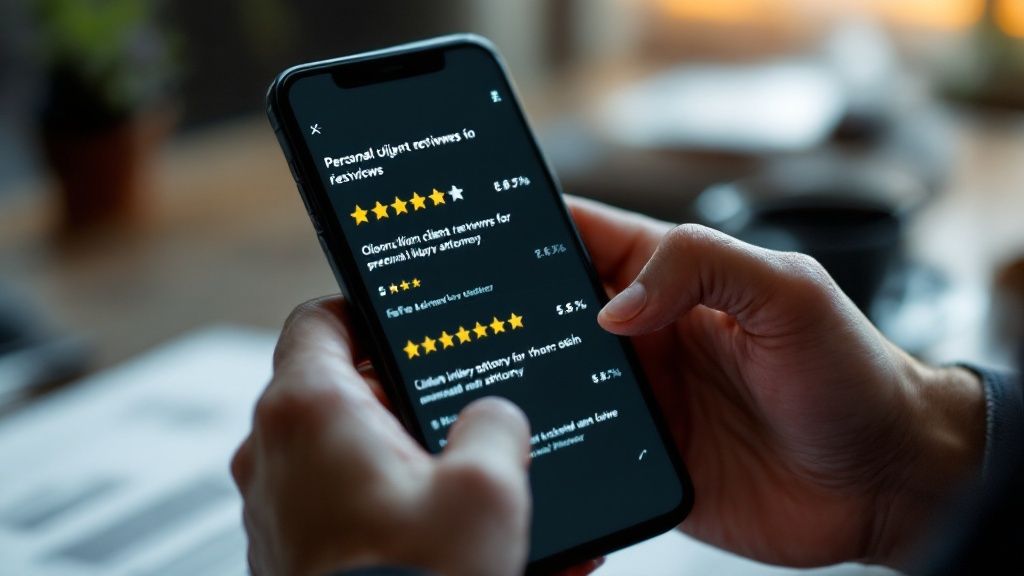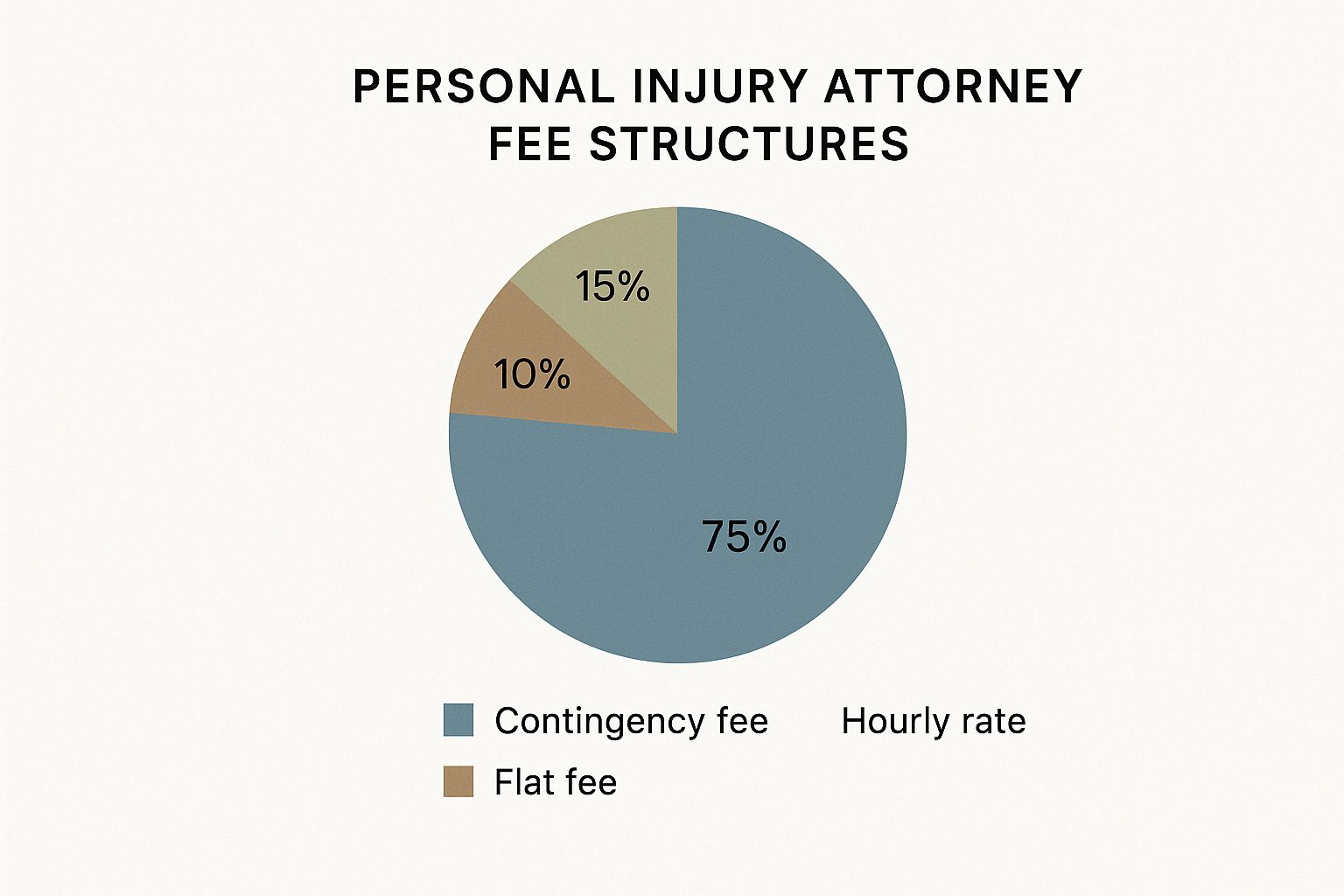How to Choose a Personal Injury Attorney
"I was satisfied once John Bell took over my case."
"Communication was always timely."
How to Choose a Personal Injury Attorney
Choosing the right personal injury attorney can set the tone for your entire recovery. You’ll want someone who brings specialized expertise, a clear fee arrangement, a history of wins and a down-to-earth communication style. These four pillars form the backbone of a strong case—and ultimately, a fair settlement.
Here’s a quick reference for the four qualities that consistently pop up in top-notch personal injury representation:
Key Attorney Qualities at a Glance
| Specialized Experience | Deep knowledge of Oregon injury statutes and courtroom nuances |
| Transparent Fee Structure | No surprises—understand your costs before any work begins |
| Proven Track Record | Demonstrated success through real verdicts and negotiated settlements |
| Supportive Communication Style | Regular updates, plain-English explanations and quick responses |
Refer back to this summary whenever you’re comparing attorneys—these core traits rarely disappoint.
Why Your First Move After An Injury Is Crucial

When the dust settles, you’re focused on healing—and rightfully so. Yet the decisions you make in those first days shape not only your physical recovery but your financial future.
Calling an Oregon personal injury lawyer early on isn’t about rushing to court. It’s about putting a shield between you and insurance adjusters who are trained to protect the bottom line. Here’s what happens next:
- They step in as your spokesperson, handling every phone call and written offer.
- They review medical reports and bills, making sure nothing is overlooked.
- They set a clear timeline so you never miss critical filing deadlines.
Preserving Evidence And Building A Strong Foundation
Evidence can vanish fast—from skid marks washed away by rain to surveillance footage erased after its retention period. A seasoned attorney moves quickly:
- Dispatching investigators to document the accident scene.
- Securing video clips before they’re deleted.
- Interviewing witnesses while memories are fresh.
And part of safeguarding your future is smart effective risk management planning long before a settlement offer appears. For a handy checklist of what to do right away, see https://www.belllawoffices.com/what-to-do-after-car-accident/.
Maximizing Your Chances For Fair Compensation
Data doesn’t lie. If you’re up against an insurance company, statistics show that legal representation can make a massive difference:
- Claimants with attorneys typically receive settlements 3.5 times higher than those negotiating solo.
- Around 91% of represented clients walk away with compensation—compared to just 51% when they go it alone.
These numbers highlight one simple fact: professional guidance transforms a stressful ordeal into a strategic process aimed at getting you what you deserve.
Key Takeaway: Your attorney takes the legal weight off your shoulders. They file the paperwork correctly, meet every deadline and negotiate with confidence, giving you the freedom to focus on getting better.
Matching an Attorney's Experience to Your Case

When you're searching for the right personal injury attorney, it's easy to assume that any lawyer with a good track record will work. But that's a common misconception. Personal injury law isn't one giant umbrella; it's a vast collection of highly specialized fields.
The lawyer who is a wizard with car accident claims might be completely out of their element in a complex medical malpractice lawsuit.
Think of it this way: you wouldn't see your heart doctor for a broken leg. The same principle applies here. The legal strategies, types of evidence, and expert witnesses needed for a trucking accident case are worlds apart from those required for a slip and fall.
Why Niche Experience Is a Deal-Breaker
The specific area a lawyer practices in day in and day out shapes their entire approach. An attorney who focuses on commercial truck accidents lives and breathes Federal Motor Carrier Safety Administration (FMCSA) regulations. In contrast, a premises liability expert knows exactly how to prove a property owner knew about a dangerous condition and failed to act.
This kind of deep, specialized knowledge is your biggest asset. It means your attorney isn't learning the ropes on your time. They’ve been down this road before, they know the insurance company's playbook, and they have a roster of trusted experts ready to go. To get a better feel for this, take a look at our breakdown of the key qualifications for an auto accident lawyer.
Your attorney’s experience should be a mirror image of your case. A precise match in expertise directly correlates to their ability to anticipate obstacles and build the strongest possible argument on your behalf.
Finding the Right Specialist for Your Claim
The odds of winning a personal injury case can change dramatically depending on the claim type. For example, plaintiffs win around 61% of motor vehicle trials. That number plummets to a staggering 19% in medical malpractice trials, where the burden of proving a doctor's negligence is incredibly high.
These figures show just how critical specialized experience is. You need someone who understands the unique challenges of your specific situation.
So, where does your case fit?
- Transportation Accidents: This is a broad category. It covers everything from standard car crashes to complex claims involving commercial trucks, motorcycles, and pedestrians. Each is governed by a different set of rules.
- Premises Liability: Commonly known as "slip and fall," these cases involve injuries that occur on someone else's property due to their negligence, like a wet floor without a warning sign or a broken railing.
- Medical Malpractice: These are some of the toughest cases to prove. You absolutely need an attorney who understands the medical "standard of care" and has experience working with medical experts to show how a provider's mistake caused your injury.
- Product Liability: If a defective product hurt you, your lawyer needs to know how to prove it. This could mean demonstrating a flaw in the product's design, a mistake during manufacturing, or a failure to warn consumers about risks.
When you sit down with a potential attorney, don't settle for a generic answer. Push them on the details. Ask them to talk about their experience with cases just like yours. A lawyer who can confidently walk you through their past successes is a strong sign you've found the expert you need.
Understanding Legal Fees and Financial Agreements

Let's talk about the elephant in the room: the cost. The good news is that worrying about how to pay a lawyer shouldn't keep you from getting the help you need after an injury.
Most reputable personal injury attorneys in Oregon work on what’s called a contingency fee basis. Put simply, this means they only get paid if you win your case. It’s a powerful model that aligns their interests directly with yours and removes the financial barrier for you to seek justice.
This arrangement takes the risk off your shoulders. You can focus on healing instead of worrying about coming up with a hefty retainer just to get started.
The Different Ways Lawyers Get Paid
The most common structure you'll encounter is the contingency fee, which is a percentage of your final settlement or verdict. This percentage typically falls somewhere between 33% and 40%.
However, you might see a couple of other models:
- Some lawyers use a sliding scale, where the percentage might change depending on when the case settles. For example, it might be a lower percentage if it settles before a lawsuit is filed and a higher one if it goes all the way to trial.
- A few firms might still use an hourly rate for very specific, complex tasks like handling a complicated appeal, but this is less common for the main personal injury claim itself.
Understanding these structures helps you find an attorney whose payment model fits the reality of your situation.
Don't Forget About Case Expenses
Beyond the attorney's fee, every case racks up its own costs. These are the out-of-pocket expenses required to build a strong case, and they are separate from the legal fee. It's crucial you know who pays for these and when.
| Court filing fees | $100–$400 per filing |
| Expert witness fees | $2,000–$10,000 per expert |
| Medical record copies | $0.50–$1.00 per page |
You'll also want to get clear answers on other potential costs, like:
- Fees for accident reconstruction experts
- Costs for deposition transcripts
- Administrative charges for copying, mailing, and other office tasks
I once had a client whose slip-and-fall case required two different engineering experts, which added up to $4,500 in expert fees alone. Because we were transparent about these costs from the start, we built that into our strategy.
How to Protect Yourself from Financial Surprises
Before you sign any agreement, you need to ask some direct questions. This isn't the time to be shy; it's your financial future on the line.
Here are three non-negotiable questions to ask:
What happens with the case expenses if we lose? Do I have to pay them back?
Do you have any policies for reducing fees if the final settlement is smaller than expected?
How will you keep me updated on the costs as they accumulate?
The answers you get are incredibly telling. They reveal an attorney's transparency and their commitment to treating clients fairly.
For a deeper dive into what you can expect, check out our guide on how much it costs to hire an auto accident lawyer. It breaks down fee structures and expense planning in more detail.
Key Takeaway: A clear, transparent fee agreement is your best defense against financial stress. It empowers you to make an informed decision and focus on what truly matters: your recovery.
When you're confident about the financial arrangement, you can build a much stronger partnership with your attorney. Asking these tough questions upfront shows you're a proactive client, which is exactly the kind of person every good lawyer wants to represent.
Remember, even small clarifications in an agreement, like putting a cap on certain expert fees, can potentially save you thousands of dollars down the road. Once you have that clarity, you can stop worrying about billing spreadsheets and put all your energy into getting better.
How to Vet an Attorney's Reputation and Track Record
When you're trying to figure out how to choose a personal injury attorney, their past performance is probably the best predictor of your future success. Forget the flashy TV ads and billboards for a moment. What you need is solid proof of real-world results, and that means doing a little digging into their professional history.
It's not just about a simple win-loss record, either. You want to get a feel for how they achieve those wins. Are they known for being tough negotiators who consistently secure large settlements? Or do they have a reputation as fierce litigators who aren't afraid to take a case to trial?
Settlements Versus Trial Verdicts
Here’s a little inside baseball for you: insurance companies keep tabs on attorneys. They know which lawyers tend to settle quickly for a lower amount and which ones will dig in their heels and fight it out in court if the offer isn't fair.
An attorney with a proven track record in the courtroom often gets much better settlement offers right out of the gate. Why? Because the insurance company wants to avoid the cost, time, and uncertainty of a jury trial at all costs. That trial-ready reputation gives your attorney—and by extension, you—tremendous leverage. Don't be shy about asking a potential lawyer about their experience with both settled cases and jury verdicts.
This image breaks down the most common fee arrangements, with the contingency fee being the standard in personal injury law.

As you can see, working on a contingency basis is how nearly all personal injury attorneys operate, which is a huge benefit for clients as it removes any upfront financial burden.
Where to Find Trustworthy Information
To get a complete picture of an attorney, you’ll want to look at a few different sources. No single source tells the whole story.
- Client Reviews: Websites like Google, Avvo, and even Yelp are great starting points. But read them with a critical eye. Look for patterns. Are clients consistently mentioning good communication and feeling heard? Or are they complaining about being left in the dark? The experience is just as important as the outcome.
- The Oregon State Bar: This is non-negotiable. Before you hire anyone, check the Oregon State Bar website. You can instantly confirm they are licensed and see if there are any public records of disciplinary action. It’s a quick, essential background check.
- Peer Ratings: Services like Martindale-Hubbell are valuable because they reflect what other lawyers and judges think. An attorney with a high rating, like an "AV Preeminent" rating, has been recognized by their peers for having the highest level of professional excellence and ethical standards.
The reality is that an attorney's success rate can look very different depending on whether a case settles or goes to trial. It's a crucial distinction to understand.
Settlement vs. Trial Success Rates
The vast majority of personal injury cases—around 90-95%—are resolved through a negotiated settlement. However, the dynamics change dramatically when a case goes before a jury. Here’s a look at the statistics.
| Settlement | 90-95% |
| Trial | ~50% |
These numbers highlight just how important it is to have an attorney who excels at negotiation but is also fully prepared to go to trial if needed. You can learn more about how case outcomes are determined and what these statistics mean for you.
Key Insight: A strong track record isn't just about a high number of wins. It’s about demonstrating strength in both negotiation, which resolves most cases, and litigation, which provides the necessary leverage to secure fair settlement offers in the first place.
Finding a Lawyer You Can Actually Talk To
When you're dealing with the aftermath of an injury, the last thing you need is a lawyer who makes you feel like just another case number. Beyond credentials and win-loss records, the actual relationship you have with your attorney is what will shape your entire experience.
Think about it—you're going to be sharing incredibly personal details about your health, your finances, and your family's stress. This partnership could last for months, if not years. If you feel rushed, ignored, or talked down to in that first meeting, imagine how it's going to feel six months down the road. You need someone you can trust, not just someone with a fancy degree.
Can You Read the Room? Gauging Their Style Early
That initial consultation is your best shot at figuring out if an attorney is the right fit for you personally. Pay close attention to the vibe. Do they actually listen, or are they just waiting for their turn to talk? A good lawyer will make you feel comfortable enough to ask the "stupid" questions.
Let's be honest, legal talk is confusing. It's filled with jargon that can make your head spin. A great attorney knows this and will take the time to break things down into plain English. If they're tossing around legal terms without explaining them, that’s a red flag. While resources for decoding legal language are useful, your lawyer should be your primary translator.
The Make-or-Break Questions to Ask About Communication
Don't leave communication up to chance. You need to know exactly how this is going to work before you sign anything. Come prepared with a few direct questions.
Here’s what I always tell people to ask:
- Who will I actually be talking to? Is it you, the lawyer I'm meeting now, or will I be handed off to a paralegal or case manager?
- How often will I hear from you? Are we talking monthly check-ins, or will I only get a call when something major happens?
- What's the best way to reach you? Do you prefer a quick email, a scheduled phone call, or is there a client portal I should use?
- If I have a question, how long will it take to get an answer? Knowing whether to expect a response in 24 hours versus a week makes a huge difference.
A Pro Tip: It's not just about what they say, but how they say it. An attorney who gives you clear, straightforward answers is showing you they value transparency. That's the foundation of a solid, supportive relationship you can count on.
Answering Your Top Questions About Finding an Attorney
After an injury, your world can feel turned upside down. It’s completely normal to have a lot of questions running through your mind as you think about getting legal help. Let’s tackle some of the most common concerns people have when trying to find the right personal injury attorney in Oregon.
When Is the Best Time to Call a Lawyer?
Honestly? The sooner, the better. The immediate aftermath of an accident is a chaotic but critical time. Evidence can disappear, witness memories can fade, and injuries need to be properly documented from day one.
Waiting too long isn't just about losing crucial details; you could also bump up against strict legal deadlines. In legal terms, this is called the statute of limitations, and if you miss it, you could lose your right to file a claim altogether.
Getting an attorney involved early doesn't automatically mean you're headed for a lawsuit. It's about protecting yourself. A good lawyer will immediately take over communications with the insurance companies, which is a huge relief. This stops you from accidentally saying something they could twist to devalue your claim later.
What Actually Goes on in a Free Consultation?
Think of a free consultation less as a sales pitch and more as a two-way interview. It’s your chance to share your story and get a feel for the attorney, and it’s their chance to determine if you have a solid case they can help with.
To get the most out of it, you should show up ready to:
- Give a clear, concise summary of the accident and your injuries.
- Bring any paperwork you've collected, like the police report, photos, or early medical bills.
- Have a list of specific questions about their experience with cases similar to yours.
A trustworthy lawyer will give you an honest first impression of your claim’s potential, walk you through how they get paid, and explain what the next steps might look like. You should never feel pressured to sign anything on the spot.
This meeting is your best gut-check. If you walk out feeling more confused, unheard, or pressured than when you walked in, that’s a major red flag. They probably aren't the right fit for you.
What If I’m Not Happy With My Current Lawyer?
You absolutely have the right to switch attorneys. If you feel like your case is sitting on a shelf collecting dust, you never get updates, or you’ve simply lost faith in their ability to fight for you, it’s smart to get a second opinion.
People change lawyers more often than you might imagine. A new attorney will typically handle all the awkward parts of the breakup for you. They'll notify your old lawyer and get your case file transferred over. Don't worry about paying double—the lawyers usually figure out how to split the fee between themselves without it affecting your bottom line.
Navigating a personal injury claim requires a guide you can trust and an advocate who will fight for you. At Bell Law, our Oregon-based attorneys are dedicated to protecting your rights and getting you the compensation you need to move forward. If you're looking for a partner to handle your case, visit us at https://www.belllawoffices.com to schedule your free, no-obligation consultation.
Disclaimer: The information on this page is provided for general informational purposes only and is not legal advice. Reading this content does not create an attorney-client relationship. For advice about your specific situation, please contact a licensed attorney.







